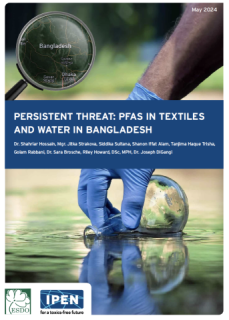
Per- and polyfluoroalkyl substances (PFAS) are a large group of persistent, toxic chemicals used widely by several industries. While PFAS in consumer products have drawn much attention, the toxic impacts of PFAS used in textile manufacturing have been less studied. This report provides new evidence linking textile-making facilities to PFAS water pollution.
Bangladesh has a large textiles sector and an increasing number of textile factories, mostly making products for export. While the fashion products sold overseas pose PFAS-contamination threats to consumers globally, residents of Bangladesh may face the greatest threats from PFAS pollution of their water and associated contamination of soils and food.
Surface water (lake and river water), tap water and clothing samples were taken for the study, and the results demonstrate that PFAS contamination is common in waterways near textile producing regions in Bangladesh. In many cases, the contamination was at high levels above current or proposed regulatory levels. The results add to the evidence that the textiles industry may be a significant source of PFAS water pollution, not only posing threats of PFAS exposures to residents of Bangladesh through water, food and clothing, but also more widely due to their properties as global pollutants.
Target audience
- Stockholm Convention Official Contact Points and National Focal Points, particularly from project countries
- National officials and experts involved in the process of reviewing and updating the NIPs
- National officials and experts involved in hazardous chemicals and waste management
- Members of NIP National Coordinating Mechanism/Committees and Project Coordination Units/Thematic Task Groups
- Representatives of regional centres
- Other stakeholders
As part of the GEF-funded and UNEP-led “Global Development, Review and Update of NIPs under the Stockholm Convention on POPs” project, the Green Growth Knowledge Partnership (GGKP) is executing Component 4, focused on disseminating information, managing knowledge and coordinating with the Stockholm Convention Secretariat to provide accessible, integrated tools and resources for all Parties.
